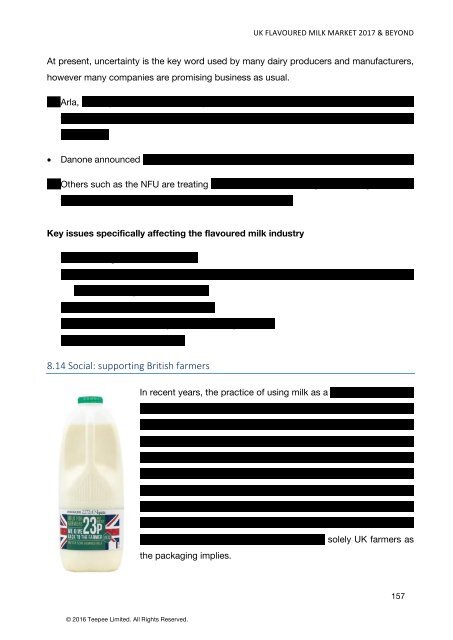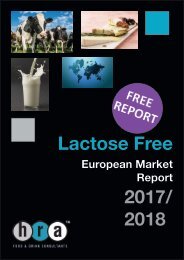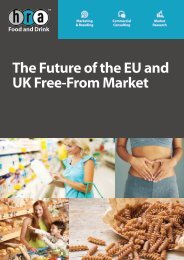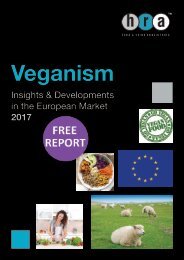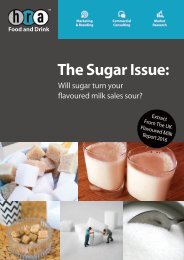Flavoured_Milk_Free
The backdrop to the UK flavoured milk market is one of relentless change. The removal of the EU milk quotas, the transition by emerging economies to a Western-style diet, the upcoming introduction of the ‘sugar tax’ and the booming sports nutrition industry are all aspects of change that create both challenges and opportunities for the UK flavoured milk market. HRA Food and Drink has developed this report as a map to guide industry stakeholders. Although volume growth in 2014 was slightly lower than in previous years, the flavoured milk market still has plenty of room for product innovation in the future.
The backdrop to the UK flavoured milk market is one of relentless change. The removal of the EU milk quotas, the transition by emerging economies to a Western-style diet, the upcoming introduction of the ‘sugar tax’ and the booming sports nutrition industry are all aspects of change that create both challenges and opportunities for the UK flavoured milk market.
HRA Food and Drink has developed this report as a map to guide industry stakeholders. Although volume growth in 2014 was slightly lower than in previous years, the flavoured milk market still has plenty of room for product innovation in the future.
You also want an ePaper? Increase the reach of your titles
YUMPU automatically turns print PDFs into web optimized ePapers that Google loves.
UK FLAVOURED MILK MARKET 2017 & BEYOND<br />
At present, uncertainty is the key word used by many dairy producers and manufacturers,<br />
however many companies are promising business as usual.<br />
• Arla, the largest farmer owned dairy cooperative in Europe, announced it is committed<br />
to business in the UK, but that free movement of milk across European states is key to<br />
its success.<br />
• Danone announced similar commitment, stating it will continue to monitor the situation.<br />
• Others such as the NFU are treating Brexit with caution, calling on the UK government<br />
to make new trade arrangements as a matter of urgency.<br />
Key issues specifically affecting the flavoured milk industry<br />
• Trade negotiation with the EU;<br />
• Removal of CAP could cause crisis in farming, potentially increasing milk prices as<br />
more farmers go out of business;<br />
• Changes in food safety legislation;<br />
• Reliance on EU bottling and co-packing facilities;<br />
• Loss of EU research funds.<br />
8.14 Social: supporting British farmers<br />
In recent years, the practice of using milk as a loss leading product<br />
has had a significant impact on farmers’ profitability. One in 10 dairy<br />
farmers have gone out of business between 2013 and 2016 (AHDB<br />
2016). This has led to consumer concern for farmers’ welfare and<br />
major retailers are beginning to respond to this. This has been<br />
mostly clearly exemplified by Morrisons’ ‘<strong>Milk</strong> for Farmers’ brand,<br />
which allows customers to voluntarily pay a premium to pass back<br />
to dairy farmers. This sparked controversy among British<br />
consumers, as it emerged that this premium is actually shared<br />
among Arla’s continental farmers rather than solely UK farmers as<br />
the packaging implies.<br />
157<br />
© 2016 Teepee Limited. All Rights Reserved.


